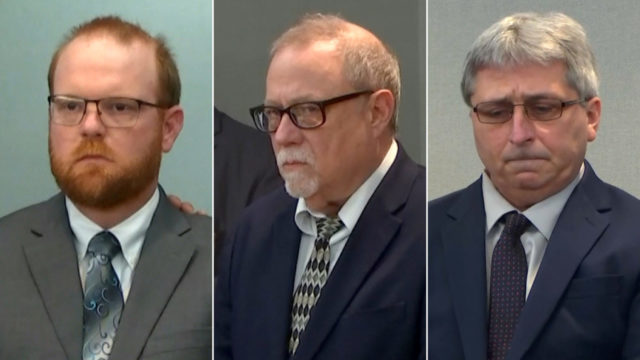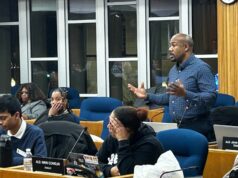
(CNN) — A jury has found the three White men who killed Ahmaud Arbery in 2020 guilty of all charges in their federal hate crimes trial, backing prosecutors’ case that the men chased the 25-year-old through the streets of a Georgia neighborhood because he was Black.
Travis McMichael, Gregory McMichael and their neighbor William “Roddie” Bryan were found guilty of interference of rights, a federal hate crime; and attempted kidnapping.
The verdict comes nearly two years to the day that Arbery was killed in a neighborhood outside Brunswick on February 23, 2020. And it’s months after the three were convicted in a state court in November of murder.
Arbery’s relatives held each other and cried — and several jurors wiped tears away from their faces — as Tuesday’s verdicts were read in the federal courtroom in Brunswick.
Outside the courthouse, Arbery family attorney Ben Crump took the hands of Arbery’s mother Wanda Cooper-Jones and father Marcus Arbery Sr. and raised them in victory.
LIVE UPDATES: Arbery’s killers found guilty in hate crimes trial
“Thank God for this good morning, that Wanda and Marcus have prayed for. It is because of their conviction to get full justice … we get to celebrate this moment,” Crump told reporters.
Cooper-Jones thanked the Justice Department for bringing the federal charges, but criticized it for initially reaching a plea deal with the McMichaels in the case. The McMichaels had agreed to plead guilty before trial, but the the judge overseeing the case rejected the deal after Arbery’s family raised concerns that the resulting sentence could lead to favorable imprisonment conditions.
Cooper-Jones said that she spoke to federal prosecutors and “begged them” to not take the plea deal in the case, and “they ignored my cry.”
“What we got today, we wouldn’t have gotten today if it was not for the fight that the family put up,” Cooper-Jones said. “What the (Department of Justice) did today, they were made to do today.”
Additionally Tuesday, Travis McMichael, 36, who fatally shot Arbery, was also found guilty on a charge of using and carrying a Remington shotgun, while his father, Gregory, 66, was found guilty of using and carrying a .357 Magnum revolver.
For the federal convictions, the three men could now receive up to life in prison and steep fines, on top of the life sentences they received for their previous murder convictions.
Tuesday’s verdict came after more than three hours of deliberations that started Monday, and after days of testimony last week.
Prosecutor: Defendants did not see Arbery ‘as a fellow human being’
In the federal trial, prosecutors sought to prove the three men acted out of racial animus. During closing rebuttal arguments on Monday, prosecutor Tara Lyons emphasized the state’s position that Arbery was killed because he was Black.
“On February 23, 2020, the three defendants did not see 25-year-old Ahmaud Arbery as a fellow human being,” Lyons said in federal court in Brunswick.
From the start of the trial, prosecutors have homed in on testimony detailing how all three defendants spoke privately and publicly about Black people using inflammatory and derogatory language, including racial slurs.
Defense attorneys have not denied the use of such language — yet argued the facts of the case show their response to Arbery was not due to his race.
Federal prosecutors and Arbery’s family have said he was out for a jog when he was killed. Defense attorneys in both trials contended the McMichaels, suspecting Arbery of trespassing multiple times at an under-construction home, pursued him in a pickup truck through neighborhood streets to stop him for police. Travis McMichael argued he shot Arbery in self-defense as they wrestled over McMichael’s shotgun.
Bryan joined the pursuit in his own truck after seeing the McMichaels follow a running Arbery in their pickup, and recorded video of the shooting.
Prosecutors at both trials conceded Arbery was at the construction site several times including the day of the shooting, but always without breaking in or taking anything, and never doing anything that would allow the men to pursue or stop him. They argued that White people visited the site apparently without being chased, and that the pursuers did not actually see Arbery at the site that day and had no knowledge he’d committed a crime.
The three men were tried in state court and found guilty of multiple murder counts in November. The McMichaels were sentenced to life in prison without parole, while Bryan was given life with the possibility of parole.
The jury for their subsequent federal comprised eight White jurors, three Black jurors and one Hispanic juror, according to details provided in court. Three White people and one Pacific Islander were selected as alternates.
Closing statements wrapped on Monday
Prosecutor Christopher J. Perras spoke at the start of the prosecution’s closing arguments Monday by going through some of the evidence presented during trial, including Facebook posts made by Greg McMichael, texts and posts by Travis McMichael, and Bryan’s use of a derogatory phrase in messages to friends.
In one example, under a Facebook video appearing to show a group of primarily Black teenagers beating a White teen, Travis McMichael commented, “I say shoot them all,” and referred to the group as “monkeys,” according to testimony from an FBI intelligence analyst.
Perras said the three pursued Arbery in a fit of vigilantism — and they did it because they saw “a Black man in their neighborhood and assumed the worst of him.”
“This wasn’t about trespassing. This wasn’t about neighborhood crimes, either. It was about race — racial assumptions, racial resentment, and racial anger,” Perras said.
Perras argued the defendants, after Arbery’s killing, falsely told police Arbery had been caught breaking into houses. That was part of a pattern, Perras said, showing the defendants knew what they had done wrong and were trying to get away with it. The men were not charged until more than two months after the shooting.
Perras argued Bryan’s pursuit of Arbery — after seeing Arbery running from the McMichaels’ truck — was based on race, citing testimony that Bryan didn’t know precisely what was happening or asked what the pursuit was about.
“He didn’t ask Ahmaud, ‘Are you OK.’ … (He assumed) the Black man was in the wrong and the White guys were in the right. … That’s how hard-wired his racial assumptions were,” Perras said.
Defense attorneys on behalf of each of the three men also spoke Monday in closing remarks, pushing back against prosecutors’ arguments.
J. Pete Theodocion, a defense attorney for Bryan, countered that Arbery never asked for help, and said Bryan would have joined the pursuit regardless of Arbery’s race. What Bryan saw was two people — in a truck he recognized from the neighborhood — asking Arbery to stop, and Arbery wasn’t stopping.
“It was entirely reasonable” to assume the person being chased did something wrong, Theodocion said. Bryan “absolutely” had “enough evidence” to follow in his own vehicle at a slow speed and record video, the lawyer said.
Amy Copeland, a defense attorney for Travis McMichael, said there is no evidence her client used a racial slur on the day Arbery was murdered, no evidence he was part of a hate group, no evidence of racial violence committed by McMichael and no evidence he talked about Arbery’s death in racial terms.
The defense attorney for Greg McMichael, attorney A.J. Balbo, told the jury his client had tenants who were people of color.
“Those are his private facilities,” Balbo said. “Gregory McMichael invited people of color, African Americans to make use of his private facilities.”
Arbery’s mother, Wanda Cooper-Jones, was seen overcome with emotion in the courtroom during the defense’s closing arguments, including when Balbo detailed the moments leading up to the fatal attack.
“He described Ahmaud as turning toward Travis and attacking Travis, which we all know now that wasn’t true,” she told reporters outside the courthouse during Monday’s lunch break. “When Ahmaud turned to Travis, Travis already had that shotgun pulled toward him.”
The timing of the closing of the trial is “great,” Cooper-Jones said, as it nears the two-year anniversary of Arbery’s death. “The anniversary date is the 23rd, and hopefully we’ll have a good verdict by the 23rd,” she said.
After recounting what Balbo claimed about her son, she said, “this has been very draining, and I’m thankful that it’s almost over.”
Previous testimony
The defense argued at the state murder trial that the pursuit began when the elder McMichael saw Arbery running from the direction of the under-construction home, and that he believed he matched the description of someone who had been recorded there previously — and of someone Travis McMichael had encountered and called police about 12 nights earlier.
Unbeknownst to the McMichaels on the day of the shooting, a neighbor had just called police to report that Arbery was at the construction site alone, and that Arbery ran as the neighbor called, according to testimony.
The prosecution in the murder trial conceded surveillance videos did show Arbery at the construction site multiple times, including the day he was killed, but always without taking anything.
In closing arguments Monday, Perras said Arbery’s reason for being there was irrelevant to the legality of the defendants’ pursuit of him, and stressed the property owner’s testimony that nothing was taken. “Maybe Ahmaud was interested in seeing the progress … (or) to clear his mind … to get away from it all. … We’ll never know for sure” because he was killed, Perras said.
The-CNN-Wire
™ & © 2022 Cable News Network, Inc., a WarnerMedia Company. All rights reserved.

































